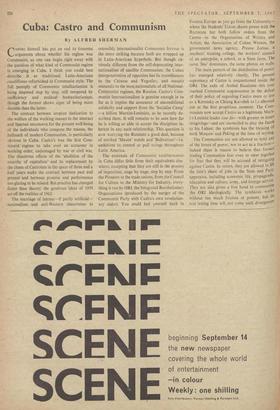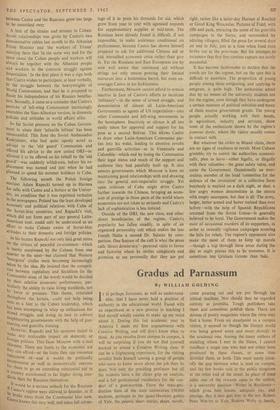Cuba: Castro and Communism
By ALFRED SHERMAN
el ASTRO himself has put an end to tiresome V./arguments about whether his regime was Communist, so one can begin right away with the question of what kind of Communist regime is emerging in Cuba. I think you could best describe it as traditional Latin-American caudillismo refurbished in Communist style. The full panoply of Communist totalitarianism is being imposed step by step, still tempered by inefficiency and residual humanitarianism, though the former shows signs of being more durable than the latter.
The contrast between utopian dedication to the welfare of the working masses in the abstract and Spartan unconcern for the present well-being of the individuals who compose the masses, the hallmark of modern Communism, is particularly obvious in Cuba. Castro's was the first Com- munist regime to take over an economy in working order, undamaged by war or civil war. The disastrous effects of the 'abolition of the anarchy of capitalism' and its replacement by the chaos of Castroism in the space of three and a half years make the contrast between past and present and between promise and performance too glaring to be missed. But practice has changed faster than theory; the generous ideas of 1959 sot off the realities of 1962.
The marriage of intense—if partly artificial— nationalism and anti-Western chauvinism to
ostensibly internationalist Communist fervour is the more striking because both are wrapped up in Latin-American hyperbole. But though ob- viously different from the self-deprecating inter- nationalism of satellite Communism, the Cuban interpenetration of opposites has its resemblances to the Chinese and Yugoslav, and mutatis mutandis to the most nationalistic of all National- Communist regimes, the Russian. Castro's Com- munist internationalism is genuine enough in so far as it implies the assurance of unconditional solidarity and support from the 'Socialist Camp' —a billion Marxist-Leninists, as he recently de- scribed them. It still remains to be seen how far he is willing or able to accept the disciplines in- herent in any such relationship. This question is now worrying the Russians a good deal, because of marked 'Maoist' trends and `Bolivarism'—i.e. ambitions to control or pull strings throughout Latin America.
The externals of Communist totalitarianism in Cuba differ little from their equivalents else- where, excepting that they are still in the process of imposition, stage by stage, step by step. From the Pioneers to the trade unions, from the Council for Culture to the Ministry for Industry, every- thing is run by ORI, the Integrated Revolutionary Organisations (produced by the merger of the Communist Party with Castro's own revolution- ary cadre). You could feel yourself back in
Eastern Europe as you go from the University— where the Students' Union shares power with the Rectorate but both follow orders from the Centre—to the Organisation of Writers and Artists, the Association of Cuban Women, the government news agency, Prensa Latina, a teachers' training college, the workers' council of an enterprise, a school, or a State farm. The same 'line' dominates, the same photos on walls.
The main pattern of the distribution of power has emerged relatively clearly. The present supremacy of Castro is unquestioned inside the ORI. The exile of Anibal Escalante this year marked Communist acquiescence in the defeat of their policy of regarding Castro more or less as a Kerensky or Chiang Kai-shek to elbowed out at the first propitious moment. The Com- munists now accept Castro as a legitimate Marx- i,A-Leninist leader sine die—with greater or lesser misgivings—and are reconciled to play the Jacob to his Laban; the symbiosis has the blessing of both Moscow and Peking at the time of writing.
The Communists are not allowed to hold anY of the levers of power, nor to act as a fraction— indeed there is reason to believe that former leading Communists fear even to meet together for fear that they will be accused of intriguing against Castro. In return, they are allowed to fill the lion's share of jobs in the State and PartY apparatus, including economic life, propaganda, education and culture, army, and foreign service. They are also given a free hand to communise the ORI ideologically. The symbiosis works without too much friction at present, but its real testing time will .not come until divergences between Castro and the Russians grow too large to be smoothed over.
A hint of the strains and 'stresses in Cuban- Soviet relationships was given by Castro's two demonstrative cables last month to the Albanian Prime Minister and 'the workers of Tirana' assuring them that 'in the same way and for the same cause the Cuban people and workers will always be together with the Albanian people and workers in the common struggle against Imperialism.' In the first place it was a sign both that Castro wishes to participate, at least verbally, in the struggle between the heavyweights of World Communism, and that he is prepared to flaunt his independence of his Russian benefac- tors. Secondly, it came as a reminder that Castro's pastiche of left-wing Communism increasingly resembles the Sino-Albanian version, in domestic policies and attitudes to world affairs alike.
So far Soviet pressure on the Cuban Govern- ment to abate their 'infantile leftism' has been unsuccessful. This June the Soviet Ambassador Kudryatsev, who had quite openly acted as adviser to the 'old guard' Communists and offered his advice to the new united ORI—or allowed it to be offered on his behalf by the 'old guard'—was suddenly withdrawn, before his re- placement was named and just when he had planned to spend his summer holidays in Cuba.
The following month the Polish foreign Minister Adam Rapacki turned up in Havana for talks with Castro and a lecture at the Univer- sity, on condition that it was reprinted verbatim in the newspapers. Poland has the least developed economic and political relations with Cuba of the Soviet-bloc countries, and Rapacki's visit, Which did not form part of any general Latin- American tour, could only be understood as an effort to make Cubans aware of Soviet-bloc attitudes to their domestic and foreign policies.
In his lecture Rapacki not only laid great stress on the virtues of peaceful co-existence—which is barely mentioned by the Cubans from one quarter to the next—but claimed that Western bourgeois' circles were becoming increasingly taken by the idea. He insisted that the competi- tion between capitalism and Socialism (in the Communist sense of the word) would be decided by their relative economic performance, par- ticularly the ability to raise living standards, not by
for or pressure. This theme, reiterated
throughout the lecture, could not help being seen as a hint to the Cuban leadership, which has been attempting to whip up enthusiasm for armed struggle, and doing its best to subvert neighbouring governments with the help of gun- running and guerrilla training However, Rapacki and his sponsors failed to foreign any noticeable impact on domestic or -1,°reign policies. This faces Moscow with a real dilemma. There are limits to the economic aid they can afford—or the loans they can renounce repayment of—and it would , be politically inconvenient as well as economically onerous r_r them to go on extending substantial aid to ad country accustomed to far higher living stan-
ds than the Russians themselves.
It would be a serious setback for the Russians
if Castrhe o's ro• s regime were allowed to founder, or if broke away from the Communist bloc now. Castro knows this very well, and takes full advan-
tage of it to press his demands for aid, which grow from year to year with agonised requests for supplementary supplies at mid-term. The Russians have already found it difficult, if not impossible, to make assistance conditional on performance, because Castro has shown himself prepared to ask for additional Chinese aid or risk intensified economic crisis rather than give in. Yet the Russians and East Europeans are by now well aware that continued aid without strings not only means pouring their limited resources into a bottomless barrel, but even en- courages Castro in his fecklessness.
Furthermore, Moscow cannot afford to remain inactive in face of Castro's efforts to inculcate `militancy'—in the sense of armed struggle, and denunciation of almost all Latin-American Governments as agents of US imperialism—into other Communist and left-wing movements in the hemisphere. Inactivity or silence is all too easily taken for approval and support for his pose as a second Bolivar. This allows Castro to draw other Latin-American Communist par- ties into his wake, leading to abortive revolts and guerrilla activities—as in Venezuela and Colombia—which end by losing the Communists their legal status and much of the support and audience they had painfully built up. It also annoys governments which Moscow is keen on maintaining good relationships with and drawing into the general anti-imperialist struggle. Yet open criticism of Cuba might drive Castro further towards the Chinese, bringing an acces- sion of prestige in those parts of the world where economics are not taken so seriously and Castro's lack of sophistication is less noticed.
Outside of the ORI, the new class, and other direct beneficiaries of the regime, Castro's popularity has fallen steadily, in spite of an organised personality cult which makes the late Joseph Stalin a second Dr. Salazar by com- parison. One feature of the cult is what the press calls 'direct democracy'—personal visits to farms and factories where he invites complaints and promises to see personally that they are put
right, rather like a latter-day Haroun al Raschid or Good King Wenceslas. Pictures of Fidel, with rifle and pack, retracing the scene of his guerrilla campaigns in the Sierra, and surrounded by adoring villagers, filled the press for several days on end in July, just at a time when food riots broke out in the provinces. But his attempts to recapture that first fine careless rapture are rarely successful.
It has become fashionable to declare that the youth are for the regime, but on the spot this is difficult to ascertain. The proportion of young people among those emigrating, and applying to emigrate, is quite high. The authorities admit that by no means all the university students are for the regime, even though they have undergone a certain measure of political selection and many of them receive government grants. The young people actually working with their hands, in agriculture, industry and services, show none of the enthusiasm shown by the regime's jeunesse doree, whom the visitor usually comes in contact with.
But whatever the exiles in Miami claim, there are no signs of readiness to revolt. Most Cubans grumble, try to outwit the authorities economi- cally, plan to leave--either legally, or illegally with their valuables the great safety valve, and curse the Government. Occasionally an over- zealous member of the local 'committee for the defence of the revolution' or a collective farm busybody is waylaid on a dark night, or shot; a few angry women demonstrate in the streets with empty saucepans, but that is all The army, larger, better armed and better trained than ever before—with the help of Spanish Republicans returned from the Soviet Union—is generally, believed to be loyal. The Government makes the most of occasional murders of its supporters, in order to intensify vigilance campaigns scouring the hills for rebels. The regime's opponents also make the most of them to keep up morale —though a trip through these areas during the day or night proves this to be nonsense. It is sometimes less Graham Greene than Saki.



































 Previous page
Previous page